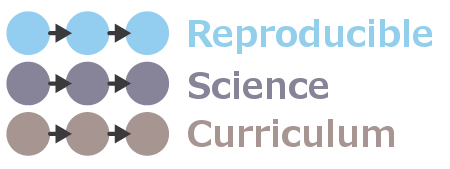Reproducible Science Workshop - Tools, Resources, and Practices
iDigBio, 105 building, teaching room (3rd floor)
June 1-2, 2015
9:00 am - 5:00 pm
Instructors: Hilmar Lapp (Duke, GCB), Ciera Martinez (University of California Davis, Plant Biology Graduate Group), François Michonneau (University of Florida, iDigBio)
Helpers: Judit Ungvári-Martin, Deb Paul, Kevin Love
Registration
Registration is now closed!General Information
Making science more reproducible has the potential to advance scientific research and make researchers' work more effective and productive. For computational and data-intensive research, which is increasingly pervasive across the sciences, this is particularly true, and yet is often seen as difficult to achieve. In this 2-day bootcamp-style hands-on workshop, we will teach a number of tools, resources, and practices that can be used today to make one's computational science more reproducible.
The course is co-run by iDigBio, and is the result of the Reproducible Science Curriculum Hackathon that was held December 8-11, 2014, at the National Evolutionary Synthesis Center (NESCent) in Durham. The hackathon and instructor travel have been supported by the National Science Foundation (NSF).
Who: The course is aimed at graduate students, postdocs, and other researchers who perform computational analysis or work. The material on automation uses basic R for teaching and illustrating the key concepts. Advanced knowledge of R is not needed, but some familiarity with R will make the workshop more enjoyable.
Where: NW 16th St. Get directions with OpenStreetMap or Google Maps.
Requirements: Participants must bring a laptop with a few specific software packages installed (listed below). They are also required to abide by our Code of Conduct, which we have adopted from Software Carpentry.
The course is free but requires registration. We ask that as a courtesy to others you cancel as early as possible if you register and subsequently are prevented from taking your seat.
Contact: Please email francois.michonneau@gmail.com for more information.
Schedule
Day 1
| 09:00 | Introduction to Reproducible Research |
| 10:30 | Coffee/Tea break |
| 12:30 | Lunch break |
| 13:30 | Organizing your project to facilitate Reproducible Research |
| 15:00 | Coffee/Tea break |
| 17:00 | Wrap-up |
Day 2
| 09:00 | Version control |
| 10:30 | Coffee/Tea break |
| 11:00 | Automating your workflows |
| 12:30 | Lunch break |
| 13:30 | Automating your workflows |
| 15:00 | Coffee/Tea break |
| 15:30 | Sharing and publishing your research workflo |
| 16:30 | Wrap-up |
Etherpad: https://etherpad.mozilla.org/GwwIWXAo95.
We will use this Etherpad for chatting, taking notes, and sharing URLs and bits of code.
Syllabus
Introduction to Reproducible Research
- Recognize the problems that reproducible research helps address
- Identify pain points in getting your analysis to be reproducible.
- The role of documentation, sharing, automation, and organization in making your research more reproducible.
- Introducing some tools to solve these problems, specifically R/RStudio/RMarkdown.
- Slides:
Organizing your project to facilitate Reproducible Research
- Organize projects and folders to enable reproducibility and reusability
- Understand the structure of data files and the importance of documenting all changes made
- Using these practices, create a reproducible project workflow using knitr in RStudio.
- Slides:
Version control
- Exposure to the motivations of using version control.
- Learn the basics of Git via Git and Github.
- Slides
Automating your workflows
- Transforming scripts into functions
- Make files as a concept
- Utilizing free continuous integration tools
- Recreate figures automatically
Sharing and publishing your research workflow
- Ensuring your workflow is permanently archived and citable
- Documentation and metadata for reusability
- Choosing licenses for software and data
- Slides
Materials
Introduction to version control
Reproducibility checklist
A checklist to evaluate and stimulate thoughts about the reproducility of your project.
Setup
Git
Git is a version control system that lets you track who made changes to what when and has options for easily updating a shared or public version of your code on github.com. See the instructions below for your operating system. Windows and Mac Users (with OSX 10.9+) will install the GitHub GUI, while Linux and Mac users with older operating systems will install the command line utility.
If you don't already have a GitHub account, please create one.
Windows
Please download the GitHub GUI here.
Mac OS X
For OS X 10.9 and higher, install the GitHub GUI for Mac by downloading and running the installer from here. For older versions of OS X (10.5-10.8) use the most recent available installer labelled "snow-leopard" available here.
Linux
If Git is not already available on your machine you can try to
install it via your distro's package manager. For Debian/Ubuntu run
sudo apt-get install git and for Fedora run
sudo yum install git.
R
R is a programming language that is especially powerful for data exploration, visualization, and statistical analysis. To interact with R, we use RStudio. After installing both R and RStudio, start RStudio and install some packages that we will need for the workshop (see bottom of the page).
There is brand new version of RStudio available as of May 26th (v0.99.441), make sure to update if you already have RStudio installed.
Windows
Install R by downloading and running this .exe file from CRAN. Also, please install the RStudio IDE.
Mac OS X
Install R by downloading and running this .pkg file from CRAN. Also, please install the RStudio IDE.
Linux
You can download the binary files for your distribution
from CRAN. Or
you can use your package manager (e.g. for Debian/Ubuntu
run sudo apt-get install r-base and for Fedora run
sudo yum install R). Also, please install the
RStudio IDE.
After installing R and RStudio
Start RStudio, and type (or copy and paste) at the console:
install.packages(c("knitr", "rmarkdown", "ggplot2", "dplyr"))
We are using Software Carpentry workshop template for this website.

